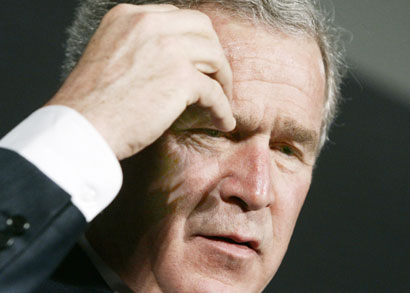WASHINGTON - US President Bush dismissed as "wild speculation" reports that
the administration was planning for a military strike against Iran.
Bush did not rule out the use of force, but he said he would continue to use
diplomatic pressure to prevent Iran from gaining a nuclear weapon or the
know-how and technology to make one.
"I know here in Washington prevention means force," Bush said at the Paul H.
Nitze School of Advanced International Studies at Johns Hopkins University. "It
doesn't mean force, necessarily. In this case, it means diplomacy."

U.S. President George W. Bush ponders a
question after delivering remarks on the global war on terror at Johns
Hopkins University in Washington, April 10, 2006.
[Reuters] |
Several weekend news reports said
the administration was studying options for military strikes. The New Yorker
magazine raised the possibility of using nuclear bombs against Iran's
underground nuclear sites.
"I read the articles in the newspapers this weekend," Bush said. "It was just
wild speculation."
Taking questions from the audience, Bush also said he declassified part of a
prewar intelligence report on Iraq in 2003 to show Americans the basis for his
statements about the threat posed by Saddam Hussein.
"I wanted people to see the truth," he told a questioner who said there was
evidence of a concerted effort by the White House to punish war critic Joseph
Wilson. Bush said he could not comment on the CIA leak case because it is under
investigation.
Sen. Chuck Schumer, D-N.Y., sent a letter to Bush on Monday asking him for
details about how the document was declassified. "There are many questions that
the president must answer so that the American people can understand that this
declassification was done for national security purposes, not for immediate
political gain."
In Tehran, officials said the media reports about a possible U.S. strike
against Iran amounted to psychological warfare from the West.
Iran's hard-line President Mahmoud Ahmadinejad told Iranians not to be
intimidated by other nations' attempts to stifle the country's nuclear
ambitions.
"Unfortunately, today some bullying powers are unable to give up their
bullying nature," Ahmadinejad said. "The future will prove that our path was a
right way."
The U.N. Security Council has demanded that Iran suspend all enrichment of
uranium ¡ª a key process that can produce either fuel for a reactor or the
material for a nuclear warhead. The security council gave Tehran until April 28
to comply before the International Atomic Energy Agency reports back to the
council on its inspection progress.
Iran has rejected the demand, saying the small-scale enrichment it began in
February was strictly for research and was within its rights under the Nuclear
Nonproliferation Treaty.
Bush and other administration officials have said repeatedly that the
military option is on the table, and White House officials acknowledge normal
military planning is under way.
Defense experts say a military strike on Iran would be risky and complicated,
and could aggravate U.S. problems in the Muslim world.
To pressure Iran, European Union foreign policy chief Javier Solana on Monday
recommended that the 25-nation bloc consider sanctions against Iran, including a
visa ban on some officials, because of Iran's rejection of U.N. demands that it
end uranium enrichment.
Bush has said Iran may pose the greatest challenge to the United States of
any other country in the world. And while he has stressed that diplomacy is
always preferable, he has defended his administration's strike-first policy
against terrorists and other enemies.
"The threat from Iran is, of course, their stated objective to destroy our
strong ally Israel," Bush said last month in Cleveland. "That's a threat, a
serious threat. It's a threat to world peace; it's a threat, in essence, to a
strong alliance. I made it clear, I'll make it clear again, that we will use
military might to protect our ally."